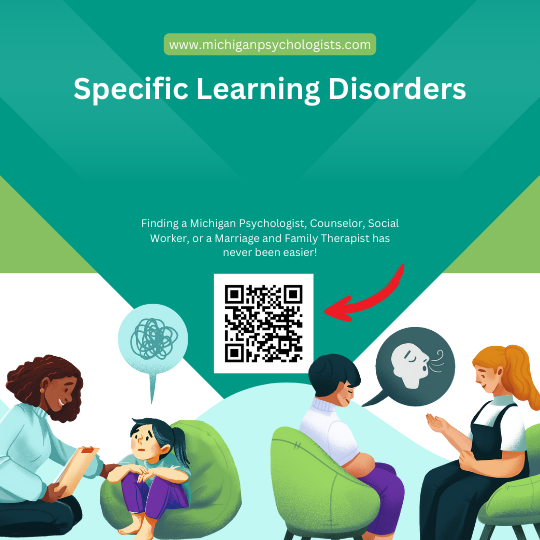Specific Learning Disorders
Home » Guide to DSM-5-TR Mental Health Disorders and Diagnostic Categories » Specific Learning Disorders

Table of Contents
Diagnostic Criteria for Specific Learning Disorders
Persistent Difficulties in Learning and Using Academic Skills
Specific Learning Disorders (SLD) are characterized by persistent difficulties in reading, writing, arithmetic, or mathematical reasoning skills during formal years of schooling. These difficulties are significantly below those expected for the individual’s chronological age, and they cause significant interference with academic or occupational performance.
Types of Specific Learning Disorders
Dyslexia
Dyslexia involves difficulties with accurate and/or fluent word recognition and by poor spelling and decoding abilities. These problems typically result from a deficit in the phonological component of language that is often unexpected in relation to other cognitive abilities and effective classroom instruction.
Dysgraphia
Dysgraphia is characterized by difficulties with spelling, poor handwriting, and trouble putting thoughts on paper. These difficulties can affect both the physical act of writing and the mental efforts required to compose text.
Dyscalculia
Dyscalculia involves difficulties in learning or comprehending arithmetic, such as problems understanding numbers, learning how to manipulate numbers, performing mathematical calculations, and understanding mathematical concepts.
Presentation of Specific Learning Disorders
Children
In children, Specific Learning Disorders often present as a noticeable gap between expected and actual performance in reading, writing, or math. Children may struggle with learning the alphabet, connecting letters to sounds, and sounding out basic words. They might have difficulty organizing their thoughts on paper, spelling words correctly, and performing basic arithmetic operations. These academic challenges can lead to frustration, low self-esteem, and reluctance to attend school.
Teens
In adolescents, Specific Learning Disorders continue to impact academic performance but may also affect self-esteem and social interactions. Teens with SLD may have difficulty with more complex reading tasks, such as understanding and analyzing texts. Writing assignments that require critical thinking and synthesis of information can be particularly challenging. Math difficulties might include trouble with algebra, geometry, and other higher-level concepts. The academic struggles can lead to disengagement from school and an increased risk of dropping out.
Adults
In adults, Specific Learning Disorders can affect performance in higher education and the workplace. Adults may continue to struggle with reading comprehension, writing coherently, and performing mathematical tasks. These difficulties can impact their ability to complete tasks efficiently, follow written instructions, and manage finances. Adults with SLD often develop coping strategies to compensate for their difficulties, but they may still experience anxiety, low self-esteem, and frustration in professional and personal settings.
Males
Specific Learning Disorders are more commonly diagnosed in males than females. Males often exhibit more externalizing behaviors, such as acting out in class, which can draw attention to their learning difficulties. These behaviors may lead to earlier identification and intervention. Males with SLD may also experience challenges with attention and hyperactivity, which can compound their academic difficulties.
Females
Females with Specific Learning Disorders may be underdiagnosed or misdiagnosed. They are more likely to internalize their struggles, leading to feelings of anxiety, depression, and low self-esteem. Girls with SLD might be perceived as inattentive or lacking effort rather than having a learning disorder. As a result, their difficulties may not be recognized until later in their academic careers, and they may not receive the support they need.
Treatment Options for Specific Learning Disorders
Children
Treatment for children with Specific Learning Disorders often includes specialized educational interventions and support. These might involve individualized education plans (IEPs) that provide accommodations such as extra time on tests, modified assignments, and specialized instruction in reading, writing, or math. Multisensory teaching techniques can be effective, as well as targeted skill-building exercises and one-on-one tutoring.
Teens
For adolescents, treatment strategies may need to address both academic and emotional needs. Academic support can include continued use of IEPs, tutoring, and access to assistive technology, such as speech-to-text software and audiobooks. Counseling or therapy can help teens develop coping strategies, build self-esteem, and manage any anxiety or depression related to their learning difficulties. Support groups can provide a sense of community and understanding.
Adults
Adults with Specific Learning Disorders can benefit from various interventions to support their educational and professional goals. These might include workplace accommodations, such as task modifications and the use of assistive technology. Continuing education and vocational training programs can help adults build skills and confidence. Cognitive-behavioral therapy (CBT) can be effective in addressing negative thought patterns and developing coping mechanisms.
Males
Treatment for males with Specific Learning Disorders should focus on both academic support and behavioral interventions. Techniques that address attention and hyperactivity, such as behavioral therapy and structured routines, can be beneficial. Encouraging active learning and engagement in the classroom can help males stay focused and motivated.
Females
Treatment for females with Specific Learning Disorders should include recognition of their emotional and psychological needs. Interventions might focus on building self-esteem and addressing co-occurring conditions such as anxiety and depression. Providing a supportive and understanding learning environment can help females feel more confident and capable. Academic accommodations and personalized learning strategies can also support their educational success.
Conclusion
Specific Learning Disorders, as described in the DSM-5-TR, present with persistent difficulties in reading, writing, and arithmetic that significantly impact academic and occupational performance. Understanding how SLD manifests in different demographics, including children, teens, adults, males, and females, is essential for providing effective treatment and support. Comprehensive intervention plans that include specialized educational strategies, behavioral support, and emotional counseling can significantly improve the quality of life for individuals with Specific Learning Disorders, helping them achieve their full potential in various aspects of life.